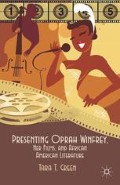Abstract
In several film productions and acting appearances by Oprah Winfrey, the trauma of the past weighs heavily on interpretations of a Black historical “presence” that invites and then forces viewers to contemplate that which is inexpressibly painful but which nevertheless must be encountered through the filmic gaze. In cinematic adaptations of classical Black literary works such as Native Son and Beloved Oprah, adopts dramatic roles that depict her as the victim of depraved experiences. I call these cultural-political productions “Trauma Dramas,” since they use cinema and television to explore injuries of race and history in dramatic vehicles for popular consumption. Instead of following the impetus of novels as prisms for contemplation of the pains and injuries of the past, these films fixate on enduring assaults and psychological injuries suffered by female protagonists—particularly those portrayed by Oprah. The cinematic adaptations of literary imaginings of the worlds within Native Son and Beloved, for example, effectively recount the long struggle for progress by African Americans in Jim Crow America and during slavery and its aftermath; but they also constitute a traumatic dilemma for viewers: What is the truth behind the racial regimes evoked through painful extractions of history and memory in the current age? What’s so good about feeling bad1 about what was done in the past? And: What are the implications of Oprah Winfrey’s production of “Trauma Dramas” on the silver screen and on television?
Access this chapter
Tax calculation will be finalised at checkout
Purchases are for personal use only
Preview
Unable to display preview. Download preview PDF.
Notes
Cedric J. Robinson, Forgeries of Memory & Meaning: Blacks & the Regimes of Race in American Theater & Film Before World War II (Chapel Hill: University of North Carolina Press, 2007), xii.
Houston A. Baker, Jr., ed., Twentieth Century Interpretations of Native Son: A Collection of Critical Essays (Englewood Cliffs, NJ: Prentice Hall, Inc., 1972);
Barbara H. Solomon, ed., Critical Essays on Toni Morrison’s “Beloved” (New York: G. K. Hall & Co., 1998).
Michael Eric Dyson, Is Bill Cosby Right? Or Has the Black Middle Class Lost Its Mind? (New York: Basic Civitas Books, 2005).
Ralph Ellison, Shadow and Act (New York: Vintage, 1953; New York: Random, 1964), 78.
Carl Plasa, ed., Toni Morrison: Beloved (New York: Columbia University Press, 1998), 37.
Toni Morrison, Beloved (New York: Alfred A. Knopf, 1987), 88–89.
Tom Raworth, in John Barrell, “Subject and Sentence: The Poetry of Tom Raworth,” Critical Inquiry 17, no. 2 (Winter 1991): 408.
Editor information
Copyright information
© 2013 Tara T. Green
About this chapter
Cite this chapter
Guthrie, R. (2013). Oprah Winfrey and the Trauma Drama: “What’s So Good About Feeling Bad?”. In: Green, T.T. (eds) Presenting Oprah Winfrey, Her Films, and African American Literature. Palgrave Macmillan, New York. https://doi.org/10.1057/9781137282460_3
Download citation
DOI: https://doi.org/10.1057/9781137282460_3
Publisher Name: Palgrave Macmillan, New York
Print ISBN: 978-1-349-44859-3
Online ISBN: 978-1-137-28246-0
eBook Packages: Palgrave Media & Culture CollectionLiterature, Cultural and Media Studies (R0)

